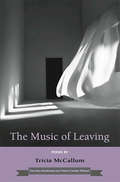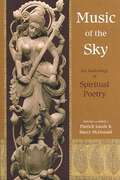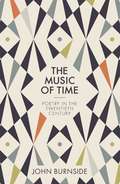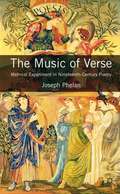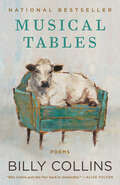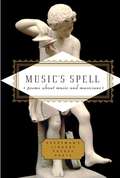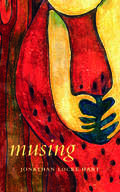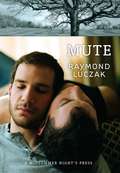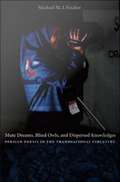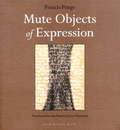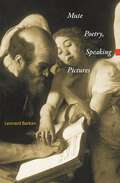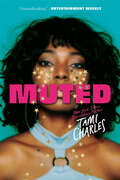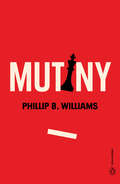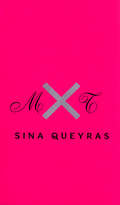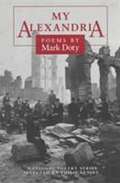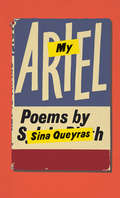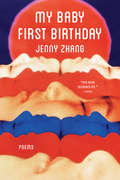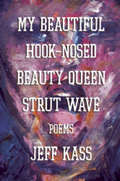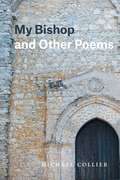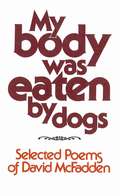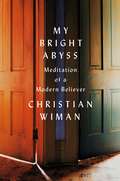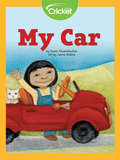- Table View
- List View
The Music of Humanity: A Critical Study of Wordsworth's Ruined Cottage Incorporating Texts from a Manuscript of 1799—1800
by Jonathan WordsworthA careful analysis including biographical information.
The Music of Leaving: Poems
by Tricia McCallumThere is a music of leaving, as surely as there is that of arriving. And it is this distinct soulful music that we often hear, however faintly, in the background of our lives. McCallum’s poems are about elephants being traipsed through the Queens Midtown Tunnel, an unstable child’s slide, and roaming island dogs. About a visit to a family home before it is sold, a late night conversation in a plane above an ocean, and shrewd Irish falcons. About eloquent gravestones, da Vinci’s unfinished joke book, the elegant legs of a heron, and landing on the moon. About a jackknife dive at dusk, a young girl’s sleepover, and a memory instantly evoked by brushing against a stand of lavender. McCallum’s hope for her new book The Music of Leaving is that it delivers to her readers those “magical moments of understanding” that a good poem can.
Music Of The Sky: An Anthology Of Spirit
by Patrick LaudeA collection of spiritual poetry from antiquity to the present, reflecting many styles and expressions of our experience of the sacred through the medium of poetry. Organized into three universal dimensions of spiritual life, the awareness of suffering and death, the experience of the depth of compassion and love, and the knowledge of the unity of the transcendent and immanent Real, Music of the Sky collects short poems from Buddhist, Christian, Hindu, Islamic, and Native American traditions. Meant neither as an historical survey of spiritual poetry, nor as a definitive collection of essential poems, the reader may open this book at any page, at any time, in virtually any situation, traveling or at rest. The truth and beauty of these poems are certain to provide a source of inspiration for countless generations.
The Music of Time: Poetry in the Twentieth Century
by John BurnsideA revelatory and deeply personal history of twentieth-century poetry by prize-winning poet and memoirist John BurnsidePoetry helps us to make sense of our world, transforming what the Russian poet Osip Mandelstam called the "noise of time" into a kind of music. The Music of Time is a unique history of twentieth-century poetry by one of today's most acclaimed poets, blending incandescent personal meditations with rare insights about a broad range of poets who distilled the essence of the moment, gave voice to our griefs and joys, and shaped our collective memory.Bringing together poets from times and places as diverse as Tsarist Russia, 1960s Harlem, and Ireland at the height of the Troubles, Burnside reveals how poetry responded to the dramatic events of the century while shaping our impressions of them. He takes readers from the trenches of World War I to a prison cell in Nazi Germany, and from Rilke's grave in the Swiss Alps to Dylan Thomas's Welsh seaside. His luminous narrative is woven through with insights into the poet's creative process as well as lyrical and thought-provoking digressions on topics ranging from marriage to the Kennedy assassination.A spellbinding work of literary history, The Music of Time reveals how poets engaged with the most important issues and events of the twentieth century, and bears personal witness to the beauty and power of an art form unlike any other.
The Music of Verse
by Joseph PhelanThrough its recovery of the metrical principles underlying the work of some of the century's major poets, this study highlights the intricacy of the relation between the 'music' of verse and its meaning, and helping us to understand the way in which the ferment of metrical experiment eventually led to the emergence of free verse.
The Music of What Happens: Poems That Tell Stories
by Paul B. JaneczkoA collection of bitter-sweet, thought-provoking poems by a variety of modern authors
Musical Tables: Poems
by Billy CollinsNATIONAL BESTSELLER • From the former United States Poet Laureate and New York Times bestselling author of Aimless Love, a collection of more than 125 small poems, all of them new, and each a thought or observation compressed to its emotional essence&“Whenever I pick up a new book of poems, I flip through the pages looking for small ones. Just as I might have trust in an abstract painter more if I knew he or she could draw a credible chicken, I have faith in poets who can go short.&”—Billy CollinsYou can spot a Billy Collins poem immediately. The amiable voice, the light touch, the sudden turn at the end. He "puts the &‘fun&’ back in profundity,&” says poet Alice Fulton. In his own words, his poems tend to &“begin in Kansas and end in Oz.&”Now &“America&’s favorite poet&” (The Wall Street Journal) has found a new form for his unique poetic style: the small poem. Here Collins writes about his trademark themes of nature, animals, poetry, mortality, absurdity, and love—all in a handful of lines. Neither haiku nor limerick, the small poem pushes to an extreme poetry&’s famed power to condense emotional and conceptual meaning. Inspired by the small poetry of writers as diverse as William Carlos Williams, W.S. Merwin, Kay Ryan, and Charles Simic, and written with Collins&’s recognizable wit and wisdom, the poems of Musical Tables show one of our greatest poets channeling his unique voice into a new phase of his exceptional career.3:00 AMOnly my handis asleep,but it&’s a start.
Music's Spell: Poems About Music And Musicians (Everyman's Library Pocket Poets Series)
by Emily FragosMusic may be the universal language that needs no words—the “language where all language ends,” as Rilke put it—but that has not stopped poets from ancient times to the present from trying to represent it in verse. <P><P> Here are Rumi and Shakespeare, Elizabeth Bishop and Billy Collins; the wild pipes of William Blake, the weeping guitars of Federico García Lorca, and the jazz rhythms of Langston Hughes; Wallace Stevens on Mozart and Thom Gunn on Elvis—the range of poets and of their approaches to the subject is as wide and varied as music itself. <P><P> The poems are divided into sections on pop and rock, jazz and blues, specific composers and works, various musical instruments, the human voice, the connection between music and love, and music at the close of life. The result is a symphony of poetic voices of all tenors and tones, the perfect gift for all musicians and music lovers.
Musing
by Jonathan Locke HartMusing is a book of sonnets. Working within the framework of a classic poetic form, Jonathan Locke Hart embarks on an extended meditation on our rootedness in landscape and in the past. As sonnets, the poems are a mixture of tradition and innovation. Throughout, Hart deftly interweaves European culture with North American settings and experience. The collection opens with a foreword by noted literary scholar Gordon Teskey, who reflects on the themes that have marked the evolution of Hart's poetry. Of Musing, Teskey writes: "These deeply thoughtful poems bring layered historical consciousness into the sonnet. They also touch and stir the heart through all its levels."
Mute
by Raymond Luczak<P>Do not be afraid of your face Move into a beam of light in the bar. Smile openly Watch his hands move quicker than strobe lights as he surveys the crowd with his friends Do not think of how hard it might be to have a casual conversation. <P>From "How to Fall for a Deaf Man" <P>Silence is always a powerful statement, but even more so in the hands of Raymond Luczak, who demonstrates in his third collection what it's like to navigate between the warring languages of confusion and clarity. <P>As a deaf gay man in the hearing world, he lends an unforgettable voice to his reality of ache and loss beyond the inadequate translation of sound.
Mute Dreams, Blind Owls, and Dispersed Knowledges: Persian Poesis in the Transnational Circuitry
by Michael M. J. FischerOver the past decade Iranian films have received enormous international attention, garnering both critical praise and popular success. Combining his extensive ethnographic experience in Iran and his broad command of critical theory, Michael M. J. Fischer argues that the widespread appeal of Iranian cinema is based in a poetics that speaks not only to Iran's domestic cultural politics but also to the more general ethical dilemmas of a world simultaneously torn apart and pushed together. Approaching film as a tool for anthropological analysis, he illuminates how Iranian filmmakers have incorporated and remade the rich traditions of oral, literary, and visual media in Persian culture. Fischer reveals how the distinctive expressive idiom emerging in contemporary Iranian film reworks Persian imagery that has itself been in dialogue with other cultures since the time of Zoroaster and ancient Greece. He examines a range of narrative influences on this expressive idiom and imagery, including Zoroastrian ritual as it is practiced in Iran, North America, and India; the mythic stories, moral lessons, and historical figures written about in Iran's national epic, the Shahnameh; the dreamlike allegorical world of Persian surrealism exemplified in Sadeq Hedayat's 1939 novella The Blind Owl; and the politically charged films of the 1960s and 1970s. Fischer contends that by combining Persian traditions with cosmopolitan influences, contemporary Iranian filmmakers--many of whom studied in Europe and America--provide audiences around the world with new modes of accessing ethical and political experiences.
Mute Objects of Expression
by Francis Ponge Lee FahnestockFrancis Ponge boldly proclaims his poetic goal in Mute Objects of Expression: "To accept the challenge that objects offer to language." These objects--less chosen than received spontaneously--are perceived with inimitable Pongean humor and rendered into glimmering still lifes. He gives voice to the often unnoticed aspects of natural objects and beings. Shunning familiar poetic modes, Ponge forges new visions, images drawn from nature, from mythology and the classics. In this volume, springing from the Loire countryside in the early 1940s, Ponge's "prôems" recall the violent perfume of the mimosa, the cries of carnations, and the flirtations of wasps. From a small note- book, his sole supply of paper withinthe wartime deprivations, he composes repeated drafts of an innovative form combining poetry with analysis and impish play. Despite the demoralizing clouds of Occupation, Ponge wrests a soaring paean to his beloved sliver of Provence.
Mute Poetry, Speaking Pictures (Essays in the Arts)
by Leonard BarkanThe skirmish between painting and poetry—from Plato and Praxiteles to Rembrandt and ShakespeareWhy do painters sometimes wish they were poets—and why do poets sometimes wish they were painters? What happens when Rembrandt spells out Hebrew in the sky or Poussin spells out Latin on a tombstone? What happens when Virgil, Ovid, or Shakespeare suspend their plots to describe a fictitious painting? In Mute Poetry, Speaking Pictures, Leonard Barkan explores such questions as he examines the deliciously ambiguous history of the relationship between words and pictures, focusing on the period from antiquity to the Renaissance but offering insights that also have much to say about modern art and literature.The idea that a poem is like a picture has been a commonplace since at least ancient Greece, and writers and artists have frequently discussed poetry by discussing painting, and vice versa, but their efforts raise more questions than they answer. From Plutarch ("painting is mute poetry, poetry a speaking picture") to Horace ("as a picture, so a poem"), apparent clarity quickly leads to confusion about, for example, what qualities of pictures are being urged upon poets or how pictorial properties can be converted into poetical ones.The history of comparing and contrasting painting and poetry turns out to be partly a story of attempts to promote one medium at the expense of the other. At the same time, analogies between word and image have enabled writers and painters to think about and practice their craft. Ultimately, Barkan argues, this dialogue is an expression of desire: the painter longs for the rich signification of language while the poet yearns for the direct sensuousness of painting.
Muted
by Tami CharlesA ripped-from-the-headlines novel of ambition, music, and innocence lost, perfect for fans of Elizabeth Acevedo and Jason Reynolds!Be bold. Get seen. Be Heard.For seventeen-year-old Denver, music is everything. Writing, performing, and her ultimate goal: escaping her very small, very white hometown.So Denver is more than ready on the day she and her best friends Dali and Shak sing their way into the orbit of the biggest R&B star in the world, Sean "Mercury" Ellis. Merc gives them everything: parties, perks, wild nights -- plus hours and hours in the recording studio. Even the painful sacrifices and the lies the girls have to tell are all worth it.Until they're not.Denver begins to realize that she's trapped in Merc's world, struggling to hold on to her own voice. As the dream turns into a nightmare, she must make a choice: lose her big break, or get broken.Inspired by true events, Muted is a fearless exploration of the dark side of the music industry, the business of exploitation, how a girl's dreams can be used against her -- and what it takes to fight back.
Mutiny (Penguin Poets)
by Phillip B. WilliamsFrom the critically acclaimed author of Thief in the Interior who writes with "a lucid, unmitigated humanity" (Boston Review), a startling new collection about revolt and renewalMutiny: a rebellion, a subversion, an onslaught. In poems that rebuke classical mythos and western canonical figures, and embrace Afro-Diasporanfolk and spiritual imagery, Phillip B. Williams conjures the hell of being erased, exploited, and ill-imagined and then, through a force and generosity of vision, propels himself into life, selfhood, and a path forward. Intimate, bold, and sonically mesmerizing, Mutiny addresses loneliness, desire, doubt, memory, and the borderline between beauty and tragedy. With a ferocity that belies the tenderness and vulnerability at the heart of this remarkable collection, Williams honors the transformative power of anger, and the clarity that comes from allowing that anger to burn clean.
MxT
by Sina QueyrasMxT, or 'Memory x Time,' is one of the formulas acclaimed poet Sina Queyras posits as a way to measure grief. These poems mourn the dead by turning memories over and over like an old coin, by invoking other poets, by appropriating the language of technology, of instruction, of diagram, of electrical engineering, and of elegy itself. Devastating, cheeky, allusive, hallucinatory: this is Queyras at her most powerful.
My Alexandria: Poems
by Mark DotyIn the search for his Alexandria, the holy city of the imagination where he might find love, transcendence, and beauty, the poet has gone into the actual cities of the world where he has found us, the unloved, the dying, the survivors, among the wreckage of our lives.
My Ariel
by Sina Queyras Sina QueyrasWhere were you when you first read Ariel? Who were you? What has changed in your life? In the lives of women? In My Ariel, Sina Queyras barges into one of the iconic texts of the twentieth century, with her own family baggage in tow, exploring and exploding the cultural norms, forms, and procedures that frame and contain the lives of women.
My Baby
by Carly Jayne RoachMy Baby is a heartwarming book that promotes early bonding between mother and baby, written by an author who gave birth during the COVID pandemic. With sweet and simple rhymes, the author conveys the love, kisses, and cuddles shared between mother and baby, as they embark on their journey of growth together. This book is a must-have for new mums, as it provides a beautiful and intimate way to connect with their babies during those early stages of life. With stunning illustrations that capture the tender moments between mother and child, readers will feel a deep sense of oneness with their little one. Whether you’re a new mum, or searching for the perfect baby shower gift, My Baby is a touching and meaningful addition to any family’s bookshelf. It’s a reminder that the love between a mother and baby is powerful and enduring, and something to be cherished for a lifetime.
My Baby First Birthday
by Jenny ZhangRadiant and tender, My Baby First Birthday is a collection that examines innocence, asking us who gets to be loved and who has to deplete themselves just to survive. Jenny Zhang writes about accepting pain, about the way we fetishize womanhood and motherhood, and reduce women to their violations, traumas, and body parts. She questions the way we feminize and racialize nurturing, and live in service of other people’s dreams. How we idealize birth and being baby, how it’s only in our mothers’ wombs that we’re still considered innocent, blameless, and undamaged, because it’s only then that we don’t have to earn love. Her poems explore the obscenity of patriarchy, whiteness, and capitalism, the violence of rescue and heroism. The magic trick in My Baby First Birthday is that despite all these themes, the book never feels like some jeremiad. Zhang uses friendship as a lyric. She seeks tenderness, radiant beauty, and having love for your mistakes. Through all this, she writes about being alone—really alone, like why-was-I-ever-born alone—and trying, despite everything, to reach out and touch something—skin to skin, animal to animal.
My Beautiful Hook-Nosed Beauty Queen Strut Wave
by Jeff KassIt's hard to be a teacher. Hard to be a father. Harder still to be a husband. So what can you do? How do you survive? You look for joy everywhere you can. You write poems about these moments to keep them alive in your breast. These poems represent hope for a better tomorrow.
My Bishop and Other Poems (Phoenix Poets)
by Michael CollierThink of a time when you’ve feigned courage to make a friend, feigned forgiveness to keep one, or feigned indifference to simply stay out of it. What does it mean for our intimacies to fail us when we need them most? The poems of this collection explore such everyday dualities—how the human need for attachment is as much a source of pain as of vitality and how our longing for transcendence often leads to sinister complicities. The title poem tells the conflicted and devastating story of the poet’s friendship with the now-disgraced Bishop of Phoenix, Arizona, interweaving fragments of his parents’ funerals, which the Bishop concelebrated, with memories of his childhood spiritual leanings and how they were disrupted by a pedophilic priest the Bishop failed to protect him from. This meditation on spiritual life, physical death, and betrayal is joined by an array of poised, short lyrics and expansive prose poems exploring how the terror and unpredictability of our era intrudes on our most intimate moments. Whether Michael Collier is writing about an airline disaster, Huey Newton’s trial, Thomas Jefferson’s bees, a piano in the woods, or his own fraught friendship with the disgraced Catholic Bishop, his syntactic verve, scrupulously observed detail, and flawless ear bring the felt—and sometimes frightening—dimensions of the mundane to life. Throughout, this collection pursues a quiet but ferocious need to get to the bottom of things.
My Bright Abyss: Meditation Of A Modern Believer
by Christian WimanSeven years ago, Christian Wiman, a well-known poet and the editor of Poetry magazine, wrote a now-famous essay about having faith in the face of death. My Bright Abyss, composed in the difficult years since and completed in the wake of a bone marrow transplant, is a moving meditation on what a viable contemporary faith—responsive not only to modern thought and science but also to religious tradition—might look like. Joyful, sorrowful, and beautifully written, My Bright Abyss is destined to become a spiritual classic, useful not only to believers but to anyone whose experience of life and art seems at times to overbrim its boundaries. How do we answer this “burn of being”? Wiman asks. What might it mean for our lives—and for our deaths—if we acknowledge the “insistent, persistent ghost” that some of us call God? One of Publishers Weekly's Best Religion Books of 2013.
My Car
by Karen KlozenbucherClimb in my car, Quick, quick, quick. Turn the key, Click, click, click.

